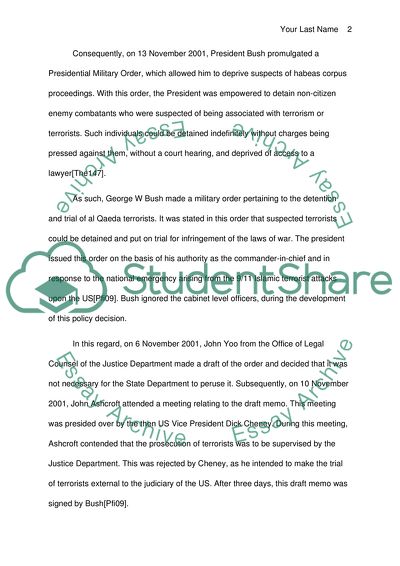Cite this document
(Presidential Prerogative to Suspend Habeas Corpus Essay Example | Topics and Well Written Essays - 1750 words, n.d.)
Presidential Prerogative to Suspend Habeas Corpus Essay Example | Topics and Well Written Essays - 1750 words. https://studentshare.org/politics/1848728-how-did-president-bush-use-his-presidential-prerogative-to-suspend-habeas-corpus-during-the-war-on-terror-after-911
Presidential Prerogative to Suspend Habeas Corpus Essay Example | Topics and Well Written Essays - 1750 words. https://studentshare.org/politics/1848728-how-did-president-bush-use-his-presidential-prerogative-to-suspend-habeas-corpus-during-the-war-on-terror-after-911
(Presidential Prerogative to Suspend Habeas Corpus Essay Example | Topics and Well Written Essays - 1750 Words)
Presidential Prerogative to Suspend Habeas Corpus Essay Example | Topics and Well Written Essays - 1750 Words. https://studentshare.org/politics/1848728-how-did-president-bush-use-his-presidential-prerogative-to-suspend-habeas-corpus-during-the-war-on-terror-after-911.
Presidential Prerogative to Suspend Habeas Corpus Essay Example | Topics and Well Written Essays - 1750 Words. https://studentshare.org/politics/1848728-how-did-president-bush-use-his-presidential-prerogative-to-suspend-habeas-corpus-during-the-war-on-terror-after-911.
“Presidential Prerogative to Suspend Habeas Corpus Essay Example | Topics and Well Written Essays - 1750 Words”. https://studentshare.org/politics/1848728-how-did-president-bush-use-his-presidential-prerogative-to-suspend-habeas-corpus-during-the-war-on-terror-after-911.


